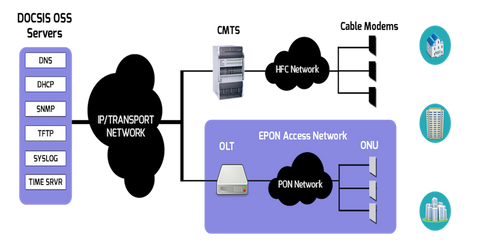Acronyms in Telecommunication: DPoE - DOCSIS Provisioning of EPON
May 17, 2017

When talking about definitions in the wireless industry, there are many acronyms used that are equally important. This is actually true for just about any industry and there is no getting away from having to know the acronyms, as just about anyone in a specific industry will be using those that are applicable to them.
There are three acronyms in one definition with this one, and it can get a bit rough:
- EPON - Ethernet Passive Optical Network.
- DOCSIS - Data Over Cable Service Interface Specification.
- DPoE - DOCSIS Provisioning of EPON.
DOCSIS describes how data is transmitted in a hybrid fiber coax (HFC) network, while DPoE describes how data is transmitted in an EPON system.
Cable Television Laboratories (CableLabs) is the R&D arm for member companies, including Comcast, Cablevision, Rogers, Charter, Time Warner Cable and Cox. The DOCSIS and DPoE standards were developed by this non-profit consortium that has been operating since 1988.
DPoE gets Optical Network Units (ONU) and EPON Optical Line Terminals (OLT) to act as if they were cable modems and cable modem termination systems (CMTS). It factors in two major characteristics - interoperability and provisioning.
Provisioning simply means configuring network equipment to only deliver the service a customer has bought. If a customer for example buys a data service that allows 100 Mbps data, the cable company has to configure the equipment to deliver no more than 100Mbps.
People often wrongly think that DPoE is DOCSIS over a network that only uses fiber. A CMTS interfaces over an HFC network by using a cable modem in DOCSIS. A virtual cable modem within the OLT interfaces over EPON to the ONU in DPoE. You might have to read that paragraph again before you fully understand it.
In the background, Operations Support Systems (OSS) facilitate an ONU provisioned with the required services. This is similar to DOCSIS cable modems. With DPoE, cable companies want to leverage training of personnel and existing capital investments by using the same OSS.
CableLabs also offers DPoE Certification Wave participation. Vendor products are certified and they participate during the certification process to demonstrate that their products comply with the specification.
The DPoE standard's second goal is to facilitate interoperability between vendors. Interoperability in the cable modem/CMTS world is when a vendor's cable modem works with another vendor's CMTS. Cisco's CMTS does for example work with cable modems from Pace, Motorola and various other vendors. DPoE defines the same type of interoperability among EPON equipment vendors. CommScope's ONUs does for example work with OLTs from Sumitomo and Alcatel Lucent, and their ONUs works with CommScope's OLTs.
Similar to the DOCSIS cable model standards, we expect that DPoE standards will continue maturing as the EPON technology evolves and new services emerge. As the majority of the cable industry transitions from the HFC-based network to an all fiber-based EPON network, the previously proven model of using standards compliant equipment becomes imperative - DPoE provides this standardization.
Share this post
3 comments


I’ve noticed something here at signalbooster.com; there are a number of technical terms and a number of acronyms. What I like is that its writers take the time to define them and break them down into easy to understand terminology. There have been one or two articles where I couldn’t follow everything, but even then, I was able to follow along more than I expected.
The acronym “dpoe vcm” isn’t something you’d think was out there, but there are apparently some complicated terms, so you need some acronyms to shorten them. The current telecommunication world is revolutionary, with cell phone boosters being one example of how people can improve their cell phones so they don’t get dropped calls. What a wonderful world!
I came here because I’m tired of my cell phone dropping calls. I wanted something to make sure my cell phone didn’t drop calls and it can download data faster. I wasn’t aware of cell phone boosters for home and cars or for similar things such as DAS installation. There are many ways to strengthen your cell phone’s signal and I like how this site tells you about everything involved from the smallest detail (like acronyms) to general information.